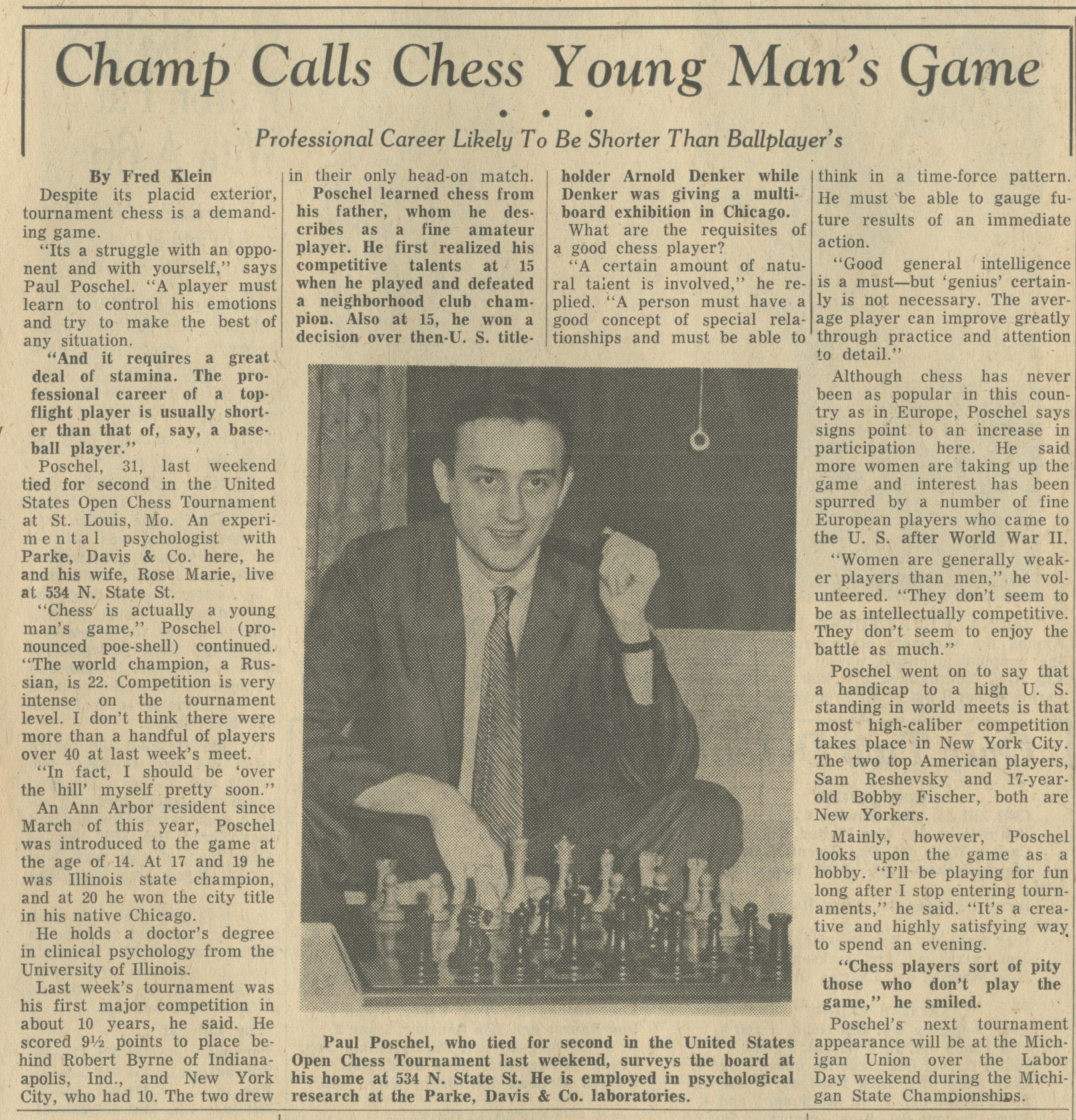Champ Calls Chess Young Man's Game

Champ Calls Chess Young Man’s Qame
• • •
Professional Career Likely To Be Shorter Than Ballplayer s
By Fred Klein
Despite its placid exterior, tournament chess is a demanding game.
“Its a struggle with an opponent and with yourself,” says Paul Poschel. “A player must learn to control his emotions and try to make the best of any situation.
“And it requires a great deal of stamina. The professional career of a topflight player is usually shorter than that of, say, a baseball player.”
Poschel, 31, last weekend tied for second in the United States Open Chess Tournament at St. Louis, Mo. An experimental psychologist with Parke, Davis & Co. here, he and his wife. Rose Marie, live at 534 N. State St.
“Chess' is actually a young man’s game,” Poschel (pronounced poe-shell) continued. “The world champion, a Russian, is 22. Competition is very intense on the tournament level. I don’t think there were more than a handful of players over 40 at last week’s meet.
“In fact, I should be ‘over the hill’ myself pretty soon.” An Ann Arbor resident since March of this year, Poschel was introduced to the game at the age of 14. At 17 and 19 he was Illinois state champion, and at 20 he won the city title in his native Chicago.
He holds a doctor’s degree in clinical psychology from the University of Illinois.
Last week’s tournament was his first major competition in about 10 years, he said. He scored 9 1/2 points to place behind Robert Byrne of Indianapolis, Ind., and New York City, who had 10. The two drew in their only head-on match.
Poschel learned chess from his father, whom he describes as a fine amateur player. He first realized his competitive talents at 15 when he played and defeated a neighborhood club champion. Also at 15, he won a decision over then-U. S. title-holder Arnold Denker while Denker was giving a multi-board exhibition in Chicago.
What are the requisites of a good chess player?
“A certain amount of natural talent is involved,” he replied. “A person must have a good concept of special relationships and must be able to think in a time-force pattern. He must be able to gauge future results of an immediate action.
“Good general intelligence is a must—but ‘genius’ certainly is not necessary. The average player can improve greatly through practice and attention to detail.”
Although chess has never been as popular in this country as in Europe, Poschel says signs point to an increase in participation here. He said more women are taking up the game and interest has been spurred by a number of fine European players who came to the U. S. after World War II.
“Women are generally weaker players than men,” he volunteered. “They don’t seem to be as intellectually competitive. They don’t seem to enjoy the battle as much.”
Poschel went on to say that a handicap to a high U. S. standing in world meets is that most high-caliber competition takes place in New York City. The two top American players, Sam Reshevsky and 17-year-old Bobby Fischer, both are New Yorkers.
Mainly, however, Poschel looks upon the game as a hobby. “I’ll be playing for fun long after I stop entering tournaments,” he said. “It’s a creative and highly satisfying way to spend an evening.
“Chess players sort of pity those who don’t play the game,” he smiled.
Poschel’s next tournament appearance will be at the Michigan Union over the Labor Day weekend during the Michigan State Championships.
(picture)
Paul Poschel, who tied for second in the United States Open Chess Tournament last weekend, surveys the board at his home at 534 N. State St. He is employed in psychological research at the Parke, Davis & Co. laboratories.
Article
Subjects
Fred Klein
University of Illinois - Alumni
U.S. Open Chess Tournament
Recreation
Parke Davis & Co.
Michigan Chess Championship
Games
Chess
Has Photo
Old News
Ann Arbor News
Sam Reshevsky
Rosemarie Poschel
Robert Byrne
Paul Poschel
Bobby Fischer
Arnold Denker
Fred Klein
534 N State St